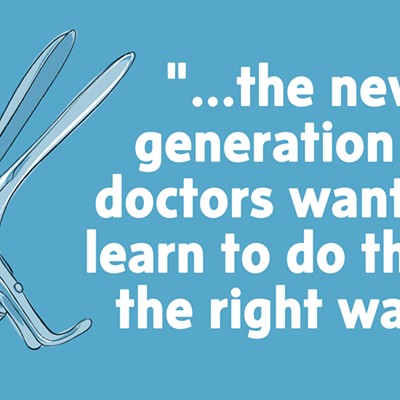This past November, Seska (she/her) celebrated 25 years in the sex industry. Over those 25 years, she’s worn a lot of hats: porn performer, cam model, escort, and even sexual health and wellness blogger.
Seska and I have been in the same professional circles for years, and our paths cross regularly at conventions and industry events. We’ve met for coffee in red carpet attire and stood in line together in the early summer Miami heat — hoping our hair wouldn’t fall and our makeup wouldn’t run before we could take refuge in the air-conditioned theaters that hosted our award shows.
By industry standards, we are both relatively old; I turn 46 next week and Seska is now 53. At these events, we are often decades older than many of our colleagues, and this is one of the reasons we gravitate toward one another. Yet her longevity in the industry reminds all of us, regardless of profession, what it looks like to gracefully embrace our changing bodies and sexuality throughout our lifespans.
For Seska, being a career sex worker has meant dealing with an expectation to remain the same, even aesthetically. “I was known for a certain haircut, and I think sometimes the fanbase wants you to stay the same,” she says. “That’s hard to navigate over 25-plus years because you’re bound to want to do something different.” And more, many of these changes are not a matter of choice. “Hair will thin out, and that’s normal,” she says.
Normalizing these changes is something that she does in her work, a sort of public education about the aging body. In her 40s she decided to grow back her pubic hair, for example, and in the last several years her fanbase has started to comment that they expected a fuller bush. These are teaching moments, “I have to say, ‘You know what? Everybody over 50 starts thinning out and most people are bald by around 75.’”
Seska can talk about these changes not only because she is older than most cam models, but also because her aging process happened much more quickly than expected, thus catapulting her into thinking deeply about its meaning. In 2022, she had a total hysterectomy because of endometrial cancer. “After the first year of perimenopause, I went straight to post-menopause, and very quickly,” she says. “Usually your estrogen gradually reduces, you don’t just flip a switch to early osteoporosis or heart issues.” Yet this is exactly what happened in her case.
Seska knew that rupture after her hysterectomy was possible and she wanted to avoid that at all costs, which meant that she had to completely change the way she related to her body, particularly when it came to vaginal penetration. She says, “I was like, ‘No reparative surgery!’ If it means I’m only going to be putting in [something the size of] a Q-tip for the rest of my life, I will only put in a Q-tip because the hysterectomy was enough.” And this was certainly a loss for her. She says, “I’ll be explicit: I was such a sturdy fucker before, and I could do high volume and good, intense banging. I miss that I can't do that … because it was great.”
While it was important for Seska to mourn what she had lost with her surgery, she also points out how important it is to recognize what her current sexual possibilities are. “I have a whole new setup down there, and it’s different,” she comments. Her original fear that she wouldn’t be able to experience orgasms or sexual pleasure was replaced with a curiosity about what a different sex life could be.
“I made it a pet project,” Seska says about learning to experience pleasure in her post-menopausal body. “I was like, ‘I’m going to try different positions, and I’m going to try different toys. I’m going to get out of my comfort zone.’” And she indeed got out of her comfort zone, started to film, and learned to experience orgasms again. But this took a lot of care. She says, “There are some things you can prepare for, but a lot of it is unexpected and you have to be gentle.” She adds, “Relationship to self is the primary thing that you need to nurture. I think we throw a lot onto a partner or lack of a partner, but your sexuality is yours.”
Her advice to people who are trying to discover their sexuality in the wake of aging, illness, or changes in relationship dynamics sounds simple. “Dance with your body, dance with your imagination, look at images that inspire you,” she says. “Have a buffet of experience and fantasies and materials that allow you to do that. Just play.” Self-play here is the key factor — learn how you experience pleasure in your body as it changes over time.
Yet just because something is simple, doesn’t mean it’s easy. As a culture, we lack comprehensive sex education that addresses how sexuality changes over a lifetime. Moreover, the messages we do get are often fear-based. Instead of asking what sexuality can look like — at any age, and in any body — all of the messages point to trying to maintain the bodies we used to have. The excessive emphasis on erectile dysfunction medicine is just one example.
Emily Foster (she/her), producer for When We’re Not Hustling, (the podcast she and I work on together), is between my age and Seska’s. We have both been very touched by Seska’s work. Her matter-of-fact attitude about the naturalness of these changes was comforting to Emily. “There was a lot of what Seska said that gave me a lot of permission,” Emily says. “I think because I’m in menopause (or perimenopause). Everything’s changing; nothing's the same and it's all very complicated.”
For me, Seska’s advice pushed me to face the very real ways that I did not handle the rapid changes in my partner’s body (which were also the result of reproductive cancer treatment) with as much grace as I wish I had. Or with as much grace as Seska did.
While I struggled with the fact that my partner suddenly found themselves in a body that felt foreign to them, I mourned the way things used to be before their treatment. My body had not changed, and I wanted things to stay the same. Wanting something doesn’t make it so, though, all it does is prevent us from seeing what is in front of us. I robbed myself and my partner of the things that could have been possible for us by focusing too much on what used to be. It is because I have made these mistakes in my own life that I am compassionate toward my clients when they tell me about similar struggles they have had in their marriages.
Had Seska told me — when I was in the thick of that — that I was primarily responsible for my sexuality, I think I could have been more gentle toward my partner, and more forgiving of myself for all of the ways I wished things stayed the same. We could have, in her words, danced more and fought less. We could have both been spared some heartache.
Emily, who is married, also picked up on this important theme. Long-term relationships require a degree of flexibility, a flexibility that takes for granted that the lives, desires, and bodies of both ourselves (and our partners) will change over time. And importantly, they may not change in the same way or at the same time. Emily reflects, “We can't hold other people responsible for our pleasure or our state of desire. Sex is important in relationships, but also we need to reflect on where we are because this is about us and our bodies and our sexuality.”
Emily talks about how the changes in her body due to aging and illness have similarly impacted her marriage as my partner’s did on ours. She says, “I’m mourning the loss of who I was, I’m mourning the loss of our relationship the way it was … And also, my husband is mourning the loss of the way I was, and he’s mourning the loss of the body and the person that I used to be.”
And yet, she also says that the sort of grace and curiosity that Seska talks about is the only real productive way to handle these changes. “All of these things are going on in our relationship, and it’s no one’s fault. It wouldn’t make any sense to blame or penalize anyone.”
But our culture trains us to look for blame, for fault, even where there isn’t any. Emily asks, “Time and happenstance are at fault. Okay, cool. Now what?”
“Now what?” seems to be the most salient question. All of our bodies change over time. Desires ebb and flow. Age and illness take things from us. But they also give things back.
Perhaps when it comes to sexuality, this is something that we ought to keep in mind. I have had remarkably beautiful sexual experiences with older clients (some in their 70s and 80s) who have shown me what it is like to reimagine pleasure and connection, and to do so with grace and gratitude. In Seska’s words, “I feel like there are manifestos we can write about how we want to age because it is a gift to age; it’s a gift. I’m ready to enjoy every season.”
Jessie Sage (she/her) is a Pittsburgh-based sex worker and writer. Her freelance writing has appeared in a variety of publications including The Washington Post, Men’s Health, VICE, The Daily Beast, BuzzFeed, Hustler Magazine, and more. At the beginning of 2024 she launched a new podcast: When We’re Not Hustling: Sex Workers Talking About Everything But.
You can find Jessie on Twitter @sapiotextual & Instagram @curvaceous_sage. You can follow her new podcast on Twitter & Instagram @NotHustlingPod. You can also visit her website jessiesage.com.













